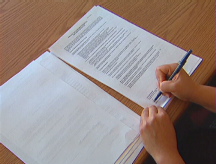How to land a bank loan
It's tougher to get business loans in this lender's market, but these tips can improve your chances.

(CNNMoney.com) -- Kenneth Barnett knows the frustrations of striking out in the loan game. In the last six months, he's been pitching his profitable, four-year-old underwater lighting manufacturer Aqua Lights to banks near his headquarters in Alpharetta, Ga. Itching to grow, the CEO is looking to borrow $500,000 in expansion capital to develop his product line and build out his staff.
With advice from local SCORE counselors and a highly honed business plan, Barnett thought his chances were good. "We were hopeful in the beginning, but so far we've been turned down three times, even from Wachovia (WB, Fortune 500) - the bank I've had a relationship with for nearly eight years," he says.
One bank indicated that he'd have been an easy loan candidate two years ago, but that in today's market, he doesn't have enough collateral. Too bad Barnett doesn't own the building that houses his company.
Small businesses nationwide have been feeling the credit crunch, but there are tips and tactics that can boost your odds of procuring that coveted loan.
Bill Bartmann, founder of Tulsa-based BillionaireU, which holds a course entitled "9 Basic Steps to Borrowing Money," reminds small business owners that potential lenders need to be thoroughly vetted. It's worth calling the institution with which you think you want to do business to scout out the basics. While there are few absolutes, there are three primary criteria used by a bank to see if a prospective borrower fits their parameters:
- The size of the loan. Smaller institutions tend to have capital constraints (either self-imposed or dictated by regulators) that restrict the size of loans they make. Larger institutions sometimes have a per-transaction minimum, which allows them to focus their managerial resources on fewer loans while still lending in significant volume.
- The industry within which the borrower is engaged. Banks will rarely lend to a entrepreneurs in an industry with which they have little experience.
- The geographic location of the business and borrower. Lenders within the federal banking system receive Community Reinvestment Act credits lending within their geographical charter area and debits for lending outside it. The challenge of dealing with varied collection laws and other local regulations makes many regional banks unwilling to lend outside certain areas.
When you call a potential lender, Bartmann recommends identifying yourself and running through all three parameters in your first phone call to the institution. The script he uses is:
"Hi, my name is John Doe and I am interested in borrowing $ (amount) for (type of business), located in (geographic area). Would your institution have an interest in visiting with me about that?"
"In a matter of a few minutes, you have found out whether this institution is even capable of making the kind and type of loan you desire," he says. "If the answer is no, you have saved lots of time and can quickly pick up the phone and call the next one on your list. If they say yes, then set an appointment to go pitch the deal - now with a higher expectation of the likelihood of success."
Look at the credit score (also known as the CRA rating) of the bank as well, recommends Leili McKinley of Haiku, Hawaii, business consultancy Soaring Phoenix. She recommends that business owners use Web sites such as iBank.com and TheStreet.com (TSCM) to make comparisons between banks.
Once you have done your due diligence, make sure your business plan is in top shape. According to Jeff Blatt, director of the North Dallas Small Business Development Center, the most critical elements of the plan are your cash flow statements and managerial experience descriptions.
"In addition to a good track record, ensure you have financial projections that are take into account details such as the rising cost of goods and transportation," he says. "It helps if you have more than three years of increasing revenues to back up your numbers."
Joe Harpster is chief credit officer for Heritage Bank in New York City, a new bank opening next month that will cater to small and mid-sized businesses. "When I meet with a business owner, I want to see a well-written plan and projections prepared by an accountant," he says.
A banking veteran with more than 30 years of experience in the industry, Harpster knows that loan officers will analyze a business' inventory, assets, and receivables. Owners need to show evidence that their inventory gets liquidated quickly, and have explanations for all sharp swings in their financial flows.
Keep in mind that the banker you meet with initially will go to a supervisor or a committee to sell the deal. Harpster recommends explaining your business very carefully and articulately so that your message gets translated accurately.
"The person taking your application can't say yes, but they may be able to say no," Bartmann cautions. "Since this person is only the messenger, make a good impression and make this person's job easy."
Also, manage your expectations as you approach a bank. Blatt has seen loan deals stretch out for long periods of time because the bank wants to test how much blood, sweat and tears the owner is willing to put into the project. He recommends that during this time, you should gather cash equity.
Finally, it goes without saying that your personal credit score - and your business score, if your company has one - should be high. Without that, in this lending environment, you can count on a quick rejection. You should know both of those scores before you approach banks, McKinley says.
Aqua Light's Barnett is still trying to find a bank loan, waiting to see if the fourth time will be the charm. He's hoping that because this next bank on his list is smaller and has a member who also serves on the board of the SBA, it may show more interest.
"I know it's a tough climate right now," he says. "With a loan, we could hire another seven people for some good-paying jobs, but without it, we have no springboard." ![]()
iReport: How's your business faring? How are the economic pressures affecting your business? Are you making fewer sales? Doing less advertising? Working longer hours? Or, has your firm found a way to thrive in the current environment? Send your photos and videos, and they could be profiled in an upcoming CNNMoney.com story.
Credit crunch hits small businesses
Pick one: Your business or your house: When cash flow gets tight, small business owners pay their business bills first, mortgages second, a new study finds.
Raising cash for a fast-growing business
-
The Cheesecake Factory created smaller portions to survive the downturn. Play
-
A breeder of award-winning marijuana seeds is following the money and heading to the U.S. More
-
Most small businesses die within five years, but Amish businesses have a survival rate north of 90%. More
-
The 10 most popular franchise brands over the past decade -- and their failure rates. More
-
These firms are the last left in America making iconic products now in their twilight. More











